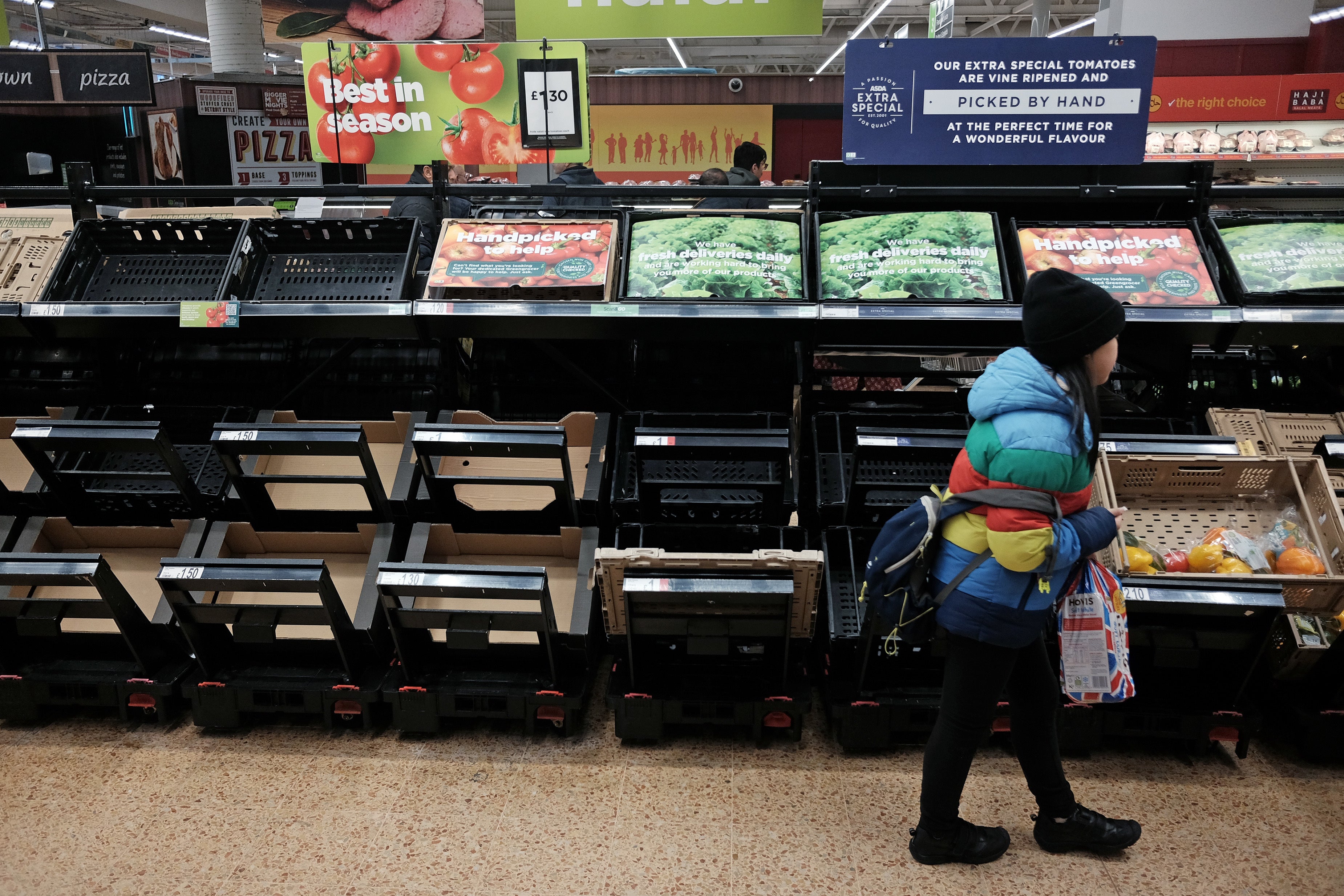New Brexit checks will make food price inflation even worse, warns industry
Firms will have to pass on extra costs of red tape, warns Fresh Produce Consortium
Your support helps us to tell the story
From reproductive rights to climate change to Big Tech, The Independent is on the ground when the story is developing. Whether it's investigating the financials of Elon Musk's pro-Trump PAC or producing our latest documentary, 'The A Word', which shines a light on the American women fighting for reproductive rights, we know how important it is to parse out the facts from the messaging.
At such a critical moment in US history, we need reporters on the ground. Your donation allows us to keep sending journalists to speak to both sides of the story.
The Independent is trusted by Americans across the entire political spectrum. And unlike many other quality news outlets, we choose not to lock Americans out of our reporting and analysis with paywalls. We believe quality journalism should be available to everyone, paid for by those who can afford it.
Your support makes all the difference.The latest wave of post-Brexit red tape could push up food prices and worsen Britain’s inflation crisis, industry leaders have warned.
The UK’s fresh produce industry said firms could be forced to pass on the extra costs of charges imposed on food and agricultural imports from the EU set to be introduced in October.
The Fresh Produce Consortium (FPC) – representing 650 members in the fresh fruit, vegetables, cut flowers and plants sectors – has written to the government about the impact of looming border checks.
The body said it expected “additional costs, delay and disruption” from the new red tape on fresh goods that would “materially contribute towards consumer inflation” as well as lead to greater food waste.
With Rishi Sunak under growing pressure to tame stubbornly-persistent inflation, his chancellor Jeremy Hunt will meet regulators this week to ask they push firms to pass on lower wholesale prices to their consumers.
But food sector leaders are increasingly worried about the extra cost of checks on imports set to be phased in from October 2023 under Boris Johnson’s exit deal with Brussels.
Nigel Jenney, the FPC chief executive, criticised the government’s plans to deal with a series of post-Brexit changes – arguing that a “highly inefficient border solution” would mean extra costs being passed on to consumers.
“The highly efficient logistics model widely adopted by our sector to deliver a complex range of highly perishable goods rapidly to several customers will be compromised at considerable additional cost,” he said.
Mr Jenny added: “UK border strategy will be directly responsible for UK food inflation.”

Business leaders fear port authorities are unprepared for the implementation of new checks, including health certifications on some animal, plant and food products from the EU.
The British Retail Consortium (BRC) has previously warned the new checks which could see supply chain disruption, leading to shortages and soaring costs.
A new charge of up to £43 per imported consignment – outlined in a consultation issued by the Department for Environment, Food and Rural Affairs (Defra) – comes alongside separate fees for customs agents and SPS inspections.
The extra costs of bringing in goods from the EU could add “hundreds of pounds” to the cost of importing each lorry-load of produce, business leaders previously told The Independent.

The government has warned business bosses that new checks on imports from the EU will add around £400m a year in extra costs – which is down from an initial estimate of just over £800m. The FPC warned that the fresh produce industry faces up to £11m in extra costs from the new Defra charge alone.
Some sector chiefs have joined Labour in calling for a new UK-EU veterinary agreement to ease trade barriers, since it would remove the need for extra sanitary and phytosanitary (SPS) checks on goods.
British Poultry Council boss Richard Griffiths warned: “The longer the issues with EU trade go on, the harder it will be to address them.”
On Monday Downing Street confirmed that Mr Hunt would meet regulators on Wednesday “to see if there’s any more we can do to ensure falls in costs are always passed on to consumers as appropriate”.
But the supermarkets have hit back at suggestions of profiteering, with BRC claiming there had been a “regular stream of price cuts” by supermarkets despite experiencing “extremely tight” profit margins.
As well as the new health certification requirement starting in October, physical checks on food and agricultural imports are set to begin in January 2024, before new safety and security declarations for all imports come into force next October.
The government has said its proposed charges of £20 to £43 per agri-food import consignment was needed under the new regime for post-Brexit checks on imports.
A government spokesperson said: “Our world-leading target operating model strikes the right balance between protecting the UK’s biosecurity while also ensuring businesses can easily move goods into Great Britain.
"We have already taken action to support businesses and prevent any delays by reducing the need for physical checks, and ensuring checks take place away from ports where this is needed.”
“We have engaged extensively with industry – including with the Fresh Produce Consortium – following the publication of the draft border target operating model, and will continue to do so, to consider what more we can do to support their readiness for the new controls, and will publish the final target operating model in the near future.”





Join our commenting forum
Join thought-provoking conversations, follow other Independent readers and see their replies
Comments